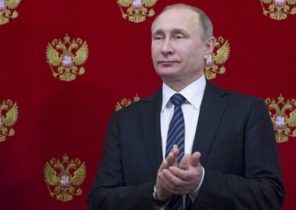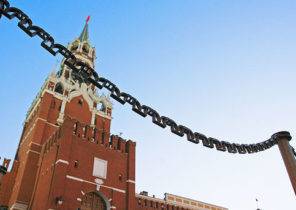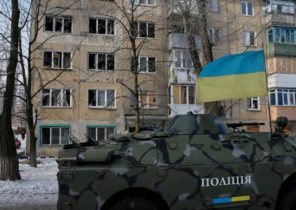
Our country is faced with a new crisis that threatens the foundations of representative democracy and freedom around the world. The threat comes from Putinism, which is a philosophy of the dictatorship, merged with a kleptocratic economy. Under this philosophy, participation of the people in the government, free and open economic system and transparency of public administration are considered as the ideological obstacles that need to be addressed in order to “make the world safe for autocracy”. His supporters aggressively oppose the US and other countries to achieve this goal, and their actions represent a clear and growing threat to our way of life.
We desperately need effective and consistent strategy combined with will power and perseverance — to overcome this attack on our system of governance and to adapt to changing environment in global security. As between different parts of the world is becoming more and more relationships, now more than ever it is important to strengthen existing alliances of our country and try to expand them in response to this attack. We will not be able to single-handedly reverse this powerful wave of autocratic ideology. We need partners and new institutions that help to solve this problem.
This is our attempt to lay the groundwork for a renewed U.S. strategy in the areas of national security and foreign policy that will meet the demands of this dangerous time.
Our country was founded on the principles of representative democracy, personal freedom and promoting the common good. After the Second world war, we strengthened and promoted these values throughout the world, creating a system of alliances, partnerships and international organizations, which, through its work, prevented the re-emergence of conditions that led to the beginning of two catastrophic wars. Despite its shortcomings, this system has provided us with a 75-year period of stability and growth, during which the freedom and prosperity gained more people than any other period in the history of mankind. Giving societies the Foundation for a more prosperous future and promoting the welfare of people, these values continue to be the main hope of the United States and around the world for the future. However, the system that underpins these values, must adapt.
After a brief period of peace established after the end of the cold war, time and mass conversion events have had a negative impact on the international system, we and our allies have built to reinforce our values. We are faced with new threats and new questions concerning how to protect global stability in a rapidly changing world. During this period had put down roots in a new authoritarian ideology close to fascism and autocracy and presented many of the plutocrats, the kleptocrats, the ultra-nationalists, professional opportunists, the state police and other secret services, who took the helm of power in their countries and gained international influence.
This plutocratic-kleptocratic authoritarian system tends to interfere with and eventually destroy democratic institutions from the inside. It fueled corruption, a network of illegitimate influence, a secret desire for personal enrichment, and she is trying to undermine the integrity of democratic institutions, as well as their ability to perform socially valuable functions. Like many authoritarian ideologies, it seeks to abolish personal rights, to weaken and destroy the structures that ensure transparency and accountability, and get rid of the idea that public officials, acting on behalf of the res publica, are obliged to divide such concepts as public good and private interests of national leaders.
Such an attack on democracy and personal freedom contributes to prosperity of many similar ideologies from nihilistic cult of enslavement, ISIS preach, and totalitarianism in North Korea to a more prudent plutocratic governments of China and Iran.
Putinism is an especially serious threat because of its expansionist nature. The Russian government has openly annexed the Crimea and part of the territories of Georgia, which marked the first such action since the Second world war. Moreover, this ideology systematically exported, in particular Russian security services that use the discontent in democratic States around the world to undermine democracy and make the world safe for autocracy. Although many such attempts were made before the financial crisis of 2008 inflicted a serious blow to democratic governments, giving Putinism able to slip through the cracks, resulting in a democratic consensus. As the chief of the General staff of the armed forces of the Russian Federation, which is the main theorist of this approach, “indirect and asymmetrical actions… can deprive the opposing party’s de facto sovereignty without the seizure of the territory of the state”.
After a serious of Moscow’s interference in the American elections of 2016 and the elections in other countries, it became clear that if you ignore this behavior, it could potentially significantly weaken representative democracy and to divide such institutions as the North Atlantic Treaty Organization and the European Union, which provided peace and security for over half a century.
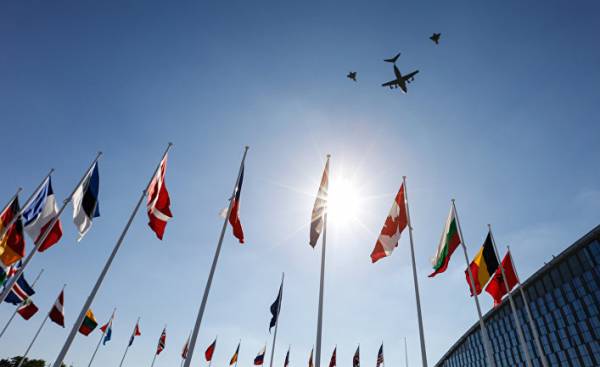 © RIA Novosti, Alexei vitvitskiy | go to fotobanka of the participating countries at the NATO summit in Brussels
© RIA Novosti, Alexei vitvitskiy | go to fotobanka of the participating countries at the NATO summit in Brussels
Since the onset of Putinism has already demonstrated the ability to erode the Foundation of our institutions and institutions of other democratic countries, we need to pay close attention in the process of developing our strategy to ensure global security. We run the risk of being helpless, if you do not recognize the existence of this risk or if we’re going to deliberately avoid this problem and move on to other topics. We have to admit that was at the center of serious conflict between our values of representative democracy, personal freedom, transparency, accountability and the promotion of the common good and values of Putinism, such as inhibition, nihilism and kleptocracy. We cannot ignore the threat posed by Putinism, if we don’t want to lose completely.
The good news is that this will happen only if we let it. We still have time to adapt, which will enable us to defend and at the same time to restore the commitment to our ideals and change the shape of the global world order thus to match the needs of the XXI century.
It is necessary to develop methods to support the values of our countries and improve our institutions so they can contain the spread of Putinism. Our companies and institutions need to be strong, United and resilient enough to serve more sophisticated and reliable alternatives to autocratic movements. We must continue to prove the value of our system of governance and economic organizations and to encourage its flourishing where people are able to see its advantages. We must be able and willing to protect our values through military force. And we must accomplish all these tasks, while continuing to act decisively and tirelessly to protect US and our allies from terrorists, ballistic missiles and many other dangers which threaten us.
Fortunately, although the danger that we have described, represents a fundamental threat, you can deal with it. Strengths of Putinism is possible to resist, if you do it correctly. Despite all the turmoil and tests in recent years, our system of government and economic structure will be able to survive. They will stand because morally they are way ahead of the grim Outlook, which imposes Putinism, and because compared with other systems are much more effective in terms of ensuring personal freedom, prosperity and hope for a brighter future. Therefore, although we need to actively resist Putinism, to strengthen the commitment of our societies, our values and renew our institutions in the long run — as it was in the cold war era — namely the confidence and patience will help us to succeed.
So, how do we fight this menace?
First, we need to make clear what our values are the Foundation of our policy. Our actions should always be due to the belief in representative democracy, individual freedom, transparency, accountability and the promotion of the common good.
This does not mean that we can’t be pragmatic or to cooperate with those partners and allies who do not share our values. It also does not mean that we should try to impose its values by force. The world is extremely diverse and complex, and compromises are an integral part of attempts to interact effectively with other countries. We need to articulate our principles, but we also need to recognise that sometimes we have to compromise to reach certain goals in the sphere of national security.
Secondly, it is absolutely necessary that we have achieved our goals, relying on alliances and partnerships and ensure that our institutions has helped to maintain freedom and democracy in the twenty-first century. For the most part these institutions have served us well. But as the world continues to change, new global powers are gaining strength, and shocks such as the Great recession, create new sources of discontent and opposition — we must recognize that the global order fundamentally changed and it is no longer similar to the structure that was established after world war II to the 1950s and 1960s.
Although today, America has become much stronger in absolute terms, it no longer has a significant economic and military superiority, which allows it to effectively impose on the rest of the world their foreign policy goals. In many ways, we became victims of our own success. Other countries are catching up with us because the order that we created in the XX century. We have to admit that now we are dealing with a number of strong players who pursue their own interests and build their own alliances. We can’t — and there’s no need to continue to behave as if we are able to achieve their goals alone. Instead of denying the multi-polar world, we must recognize it and use it to their advantage.
For this reason, priority must be building and strengthening alliances and partnerships, and we should as often as possible to work through them. We have a new convenient way to ensure the formation of solidarity in support of stability and support for democratic values. We must remain steadfast in our commitment to existing alliances and partnerships and use them as essential tools to achieve our goals in the area of security. We must also look for opportunities to adapt existing global institutions to the current global shift and create new institutions that promote democracy and confront the threat of Putinism.
For example, strengthening the NATO and the European Union, we must now critically evaluate the threats that putinistskoy campaign to spread the influence pose to these communities, and to integrate methods of resistance in their collective Toolbox. The NATO Alliance can be reformed so as to help its members to track and to expose Russian influence networks. Strengthening institutions, increasing transparency, and special attention to combating corruption must be the priorities of the European Union. A new agreement between NATO and the European Union in such areas as cyber warfare, can be concluded to combat Russian influence.
Meanwhile, we must build new partnerships and alliances that will help us to achieve our goals in this new era. It is worth noting that many of these institutions will not look exactly the same as those institutions that helped us to survive the cold war because, as emphasized by analysts of Putinism, “corruption is the grease, through which this [putinistskoy] system” and “ultimately because of the lack of strict control and transparency of democratic institutions, the latter easily available for exploitation.” Our efforts should be directed to cope with this reality.
When we analyze the new conditions in the world, perhaps we need to consider the possibility of new alliances — regional and global — to strengthen the position of representative democracy, to counter cyberinsurance and propaganda methods of undermining democratic values, to combat corruption, to promote transparency, to strengthen the freest economies and to exchange knowledge in the field of countering new dangers, damaging to our societies.
Third, while we fight an ideological threat to Putinism, we need to ensure the welfare and safety of the American people and peoples of our allies and partners. This in itself is an extremely complex task, which includes our ongoing fight against terrorist groups and their ideologies, our attempts to prevent the proliferation of nuclear weapons, and attempts to restrain North Korea and other political forces who want to harm us. We need to persevere and stick to the strategy in our partnering efforts to dismantle terrorist groups, eliminate their leaders, destroying their networks and depriving them of their attractiveness in the eyes of the population. And we absolutely have to make clear that those who dare to attack us or our allies, in grave danger.
Fighting the spread of Putinism, we must invest in international security, to ensure that our NATO allies and other partners will be able to defend itself against military aggression of Russia. To do this we need to develop a strategy to confront Russia by military means, involving including advance deployment of military equipment, strengthening relations with our strategic partners and increase the number of exercises with European countries, as well as the systematic planning of a struggle with Russian cyber-attacks, propaganda and hybrid methods of warfare. We need to consider carefully the response that our investment has strengthened our position in the field of national security and would allow us to sell our interests in the sphere of ensuring the stability of the nuclear balance and strengthen the institutions underpinning global security. For example, our position will weaken if the answer to the provocations of Russia, we decide to leave our alliances and agreements and start the senseless nuclear arms race.
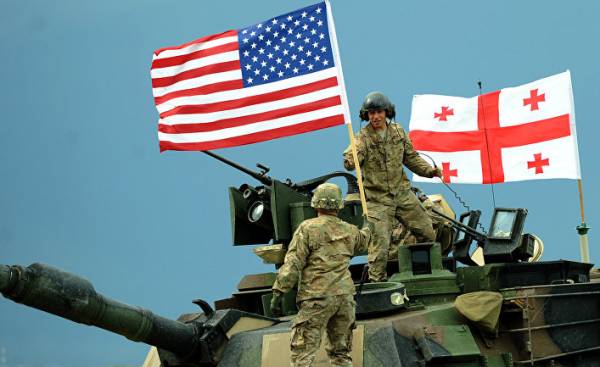 © AFP 2016, Vano ShlamovАмериканские soldiers during the us-Georgian joint military exercise Noble Partner
© AFP 2016, Vano ShlamovАмериканские soldiers during the us-Georgian joint military exercise Noble Partner
Fourth, diplomacy and development are critical elements of this equation. Just as we cannot function without our partners, we cannot rely solely on armed forces, neglecting diplomacy and development. We must recognize that Putinism cannot be overcome simply by using the military power, we must therefore develop an appropriate response, involving all the government. Economic development and the strengthening of civil society will be key in this fight. In addition, we need to consider how to direct diplomatic efforts and development efforts to counter putinistskoy tactics.
With the help of the state Department and other Federal agencies should develop new mechanisms to strengthen the freedom of the press, to quickly disseminate accurate information and to support effective forms of struggle against Putin’s propaganda. You need to tell the world about how dangerous Russian influence and how to react to it, and to support the creation of new institutions and efforts to combat corruption. Huge importance will be attempts to divide the world of money and politics, to protect the electoral system and shut off the illegal cash flow. In addition to the active actions of the US state Department and the U.S. Agency for international development, these goals can contribute to initiatives such as expanding the number of candidate countries for assistance from the Corporation “Millennium Challenges”, which invests in combating poverty in countries that occupy a fairly high place in the rankings for such indicators as rule of law and the fight against corruption.
Fifth, if we want to stop Putinism succeed in its attempts to portray a representative democracy a failed system of government and to reach out to those who are dissatisfied with their social position, one of the first items on the agenda — to ensure that our countries have a healthy economy that supports a wide range of possibilities. Statist crony-oligarchic capitalism is an inherently weak business model, but if we fail to comply with the social contract and to ensure equal growth in our own countries, the analysts of Putinism, it will open up for Putinism the opportunity to achieve their objective, namely, to “strengthen the conviction of the incapacity of the Western democratic and economic systems and weakening the European Union and the attractiveness of the West, the credibility and moral authority.”
Indeed, the need to prove that American society is obliged to fulfill its promises, has played an important role in our strategy of containing the Soviet Union in the cold war era. As explained by George Kennan (George Kennan), architect of the containment strategy, the rivalry with the Soviet authorities, rather, was, “how successful will be our efforts to create among the peoples of the world view of the US as a country that knows what she wants, which is coping successfully with its internal problems and responsibilities of a great power and which has sufficient fortitude to firmly defend their positions in the contemporary ideological currents.” In his opinion, “to avoid destruction, the United States is enough to be up to its best traditions.” The desire to make government and society work for the benefit of people has always been important, but in this confrontation, it plays a much more significant role.
Finally, we must also recognize that the program to counter Putinism requires the creation of new methods of political resistance. We need to make our society sustainable to putinistskoy tactics that are used against us the openness of our systems and our commitment to rules and procedural rules.
Putinistskoy tactics “gray zone”, which implies actions below the threshold of open conflict and a specific answer, be a real test for our ability to recognize them and neutralize before it’s too late. Since the majority of representative democracies are not adapted for such methods and many of these threats are deliberately ambiguous, we have not yet managed to develop a sustainable norms, concepts and institutions that would help us to deal with this threat.
If you look back, it becomes clear that the threat of Russia’s intervention in the American elections in 2016 deserve much more decisive answer than the one that U.S. officials made at the time. We should try to make new information about such threats gave impetus to the development of new policies, can be an effective tool of resistance. And we need to take into account the vast experience gained by our allies and partners in the process of dealing with similar threats.
For example, despite the fact that the Russian has funded many of the candidates who had applied for the post of President of France in the elections of 2017, and that they, undoubtedly, had a major hacking attack aimed at harming the President of the Emmanuel Macron on the eve of the vote, the French electorate was aware of the danger, so they could not surprise. We can learn many lessons from this and other similar examples. Possible responses may include a variety of steps, from the introduction of sanctions and the organization of cybercanine to public education and cooperation with private companies such as Facebook, Twitter, and traditional news organizations. The development and spread of these protective tools will be one of our main objectives in the fight against this new threat.
In the long run, if we manage to formulate these policy approaches, we will be likely to deprive our opponents-Putinists advantages and win this ideological competition. As in the past century, we can defeat this new difficulty while updating our values, and to build a better world.
Members of the U.S. house of representatives from the Democratic party Adam Smith (Adam Smith), Seth Moulton (Seth Moulton), Stephanie Murphy (Stephanie Murphy), Ruben Gallego(Ruben Gallego), Joe Courtney (Joe Courtney)



